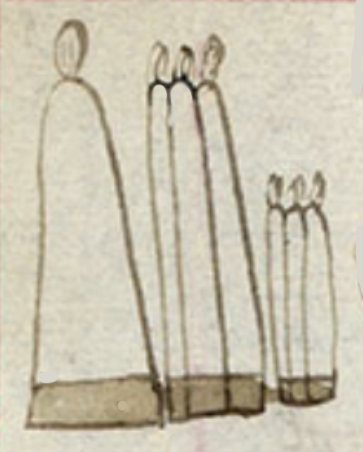candelas (CST36)
This painting of the simplex glyph for the term candelas (a Spanish loanword that entered Nahuatl, meaning candles) shows a group of vertical candles of varying thicknesses and heights. They have lit wicks, and they have a dark color at their bases. The companion text explains that four arrobas (a Spanish measure of about 25 pounds each) of Easter candles were necessary for the church. The cost was the significant sum of 100 pesos.
Stephanie Wood
For more on the Codex Sierra, see Kevin Terraciano’s study (2021).
Stephanie Wood
1550–1564
Jeff Haskett-Wood
candelas, vela, fuego, luz, iglesia, religión cristiana

candela, candle, https://nahuatl.wired-humanities.org/content/candela
velas
Stephanie Wood
Códice Sierra-Texupan, plate 36, page dated 1561. Origin: Santa Catalina Texupan, Mixteca Alta, State of Oaxaca. Kevin Terraciano has published an outstanding study of this manuscript (Codex Sierra, 2021), and in his book he refers to alphabetic and “pictorial” writing, not hieroglyphic writing. We are still counting some of the imagery from this source as hieroglyphic writing, but we are also including examples of “iconography” where the images verge on European style illustrations or scenes showing activities. We have this iconography category so that such images can be fruitfully compared with hieroglyphs. Hieroglyphic writing was evolving as a result of the influence of European illustrations, and even alphabetic writing impacted it.
https://bidilaf.buap.mx/objeto.xql?id=48281&busqueda=Texupan&action=search
The Biblioteca Digital Lafragua of the Biblioteca Histórica José María Lafragua in Puebla, Mexico, publishes this Códice Sierra-Texupan, 1550–1564 (62pp., 30.7 x 21.8 cm.), referring to it as being in the “Public Domain.” This image is published here under a Creative Commons license, asking that you cite the Biblioteca Digital Lafragua and this Visual Lexicon of Aztec Hieroglyphs.


